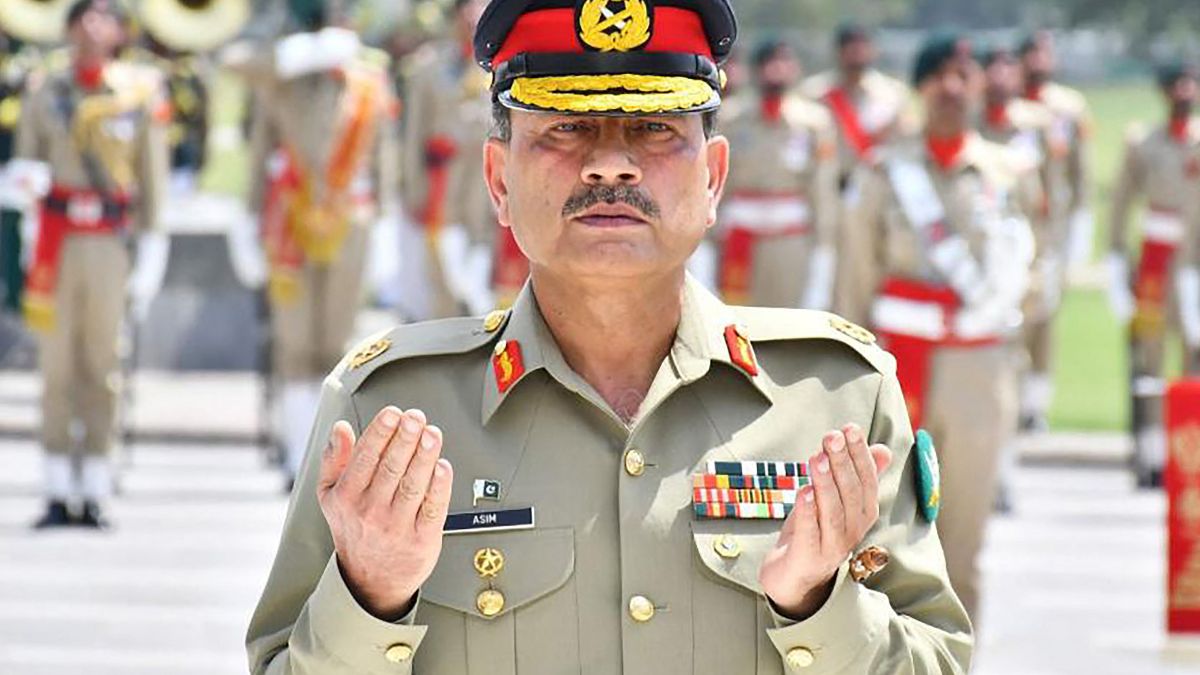Pakistan Army chief Asim Munir is reportedly set to visit the United States this week. He will be attending the US Army’s celebrations to mark its 250th anniversary on Saturday (June 14) in Washington, DC.
The US Army will organise a parade on the streets of the American capital on the date coinciding with President Donald Trump’s 79th birthday. The presence of Pakistan’s Chief of Army Staff (COAS) Munir at the celebrations will come over a month after strikes and counterstrikes between India and Pakistan.
But what’s behind his visit?
Let’s take a closer look.
Pakistan’s Asim Munir to visit US
Pakistan Army chief Asim Munir, who was recently promoted to field marshal, will join other military leaders in Washington, DC, for the US Army’s celebrations on Saturday, top intelligence sources have told CNN-News18.
He is likely to arrive in the US on Thursday (June 12), the report said, citing sources at the Pakistani Embassy in Washington, DC.
Munir’s first visit to the US as Pakistan’s army chief was in 2023 when he met the then American Defense Secretary Lloyd Austin, deputy Secretary of State Stephen Biegun and UN Secretary-General António Guterres.
Reacting to the visit at the time, New Delhi had said: “Our concerns for Pakistan’s support to terrorism, its support to cross-border attacks is well-known. We would hope that other countries would also take counter-terrorism seriously.”
In April, a US delegation had met Munir in Rawalpindi and discussed regional security and cooperation in the defence sector, according to a statement by Pakistan’s Inter-Services Public Relations (ISPR).
Why is the Pakistan army chief going to US?
Asim Munir’s trip to the US has garnered attention amid Pakistan’s tensions with India. However, his visit might not have an India angle but concern Islamabad’s all-weather ally, China.
As per the CNN-News18 report, Washington has doubts about Pakistan’s neutrality due to its closeness to China through schemes like the Belt and Road Initiative (BRI) and the China-Pakistan Economic Corridor (CPEC).
In view of the present geopolitical environment, the US may not view Pakistan as a “credible or neutral mediator”, sources said.
America is opposed to China’s expanding influence in the world, especially in Asia.
The Trump administration is also expected to nudge Pakistan to act against terrorist groups targeting Afghanistan and India during Munir’s visit, as per the report.
On its part, Islamabad could urge the US for assurances against the Tehrik-i-Taliban Pakistan (TTP), which it accuses of using Afghan soil to launch attacks on Pakistan — a charge rejected by Kabul.
Pakistan, which is rich in lithium, copper, gold, and rare earth minerals, is eager for investment from foreign powers. This comes as it is wary of a potential debt trap linked to Beijing’s BRI. At $15 billion, China is already Pakistan’s biggest bilateral lender.
Munir’s trip is also aimed at improving the strained security relationship between the US and Pakistan. The Pakistan army chief could also push for Washington’s mediation on Kashmir, a move India is unlikely to approve of.
After claiming that he brokered the ceasefire between India and Pakistan last month, Trump offered to mediate to resolve the Kashmir issue. New Delhi dismissed the US president’s remarks, with the Ministry of External Affairs (MEA) reaffirming India’s position that all issues related to the Union Territory must be settled bilaterally between the two neighbours.
“We have a long-standing national position that any issues pertaining to the Union Territory of Jammu and Kashmir have to be addressed by India and Pakistan bilaterally. That stated policy has not changed. As you are aware, the outstanding matter is the vacation of illegally occupied Indian territory by Pakistan,” MEA spokesperson Randhir Jaiswal said during a briefing.
Protests during Munir’s US visit?
Imran Khan’s Pakistan Tehreek-e-Insaf (PTI) party has threatened to protest in the US during Munir’s visit.
PTI’s Secretary for Overseas Affairs, Sajjad Burki, called for a protest outside the Pakistan embassy in Washington on Saturday. “Let the White House know that any deal with this government is not acceptable to the people of Pakistan,” Burki wrote on X.
According to Pakistani daily Dawn, the US and Pakistani officials have not been tight-lipped about Munir’s trip, likely due to security concerns and diplomatic caution, given the protest calls.
India-Pakistan tensions
While Munir’s visit has more to do with the US-China rivalry, it comes against the backdrop of the recent conflict between India and Pakistan.
Tensions between the two rival neighbours peaked after Indian strikes on nine terror sites in Pakistan and Pakistan-occupied Kashmir (PoK) under Operation Sindoor post the Pahalgam terror attack.
After four days of conflict, the two countries agreed to a ceasefire , for which Trump took credit. In fact, the US president declared the ceasefire half an hour before Foreign Secretary Vikram Misri’s announcement.
India has since reiterated its anti-terrorism stance and held Pakistan responsible for the April 22 Pahalgam attack.
During his recent Europe visit, External Affairs Minister S Jaishankar told Politico: “We are not going to live with it. So our message to them is that if you continue to do the kind of barbaric acts which they did in April, then there is going to be retribution, and that retribution will be against the terrorist organisations and the terrorist leadership.”
“We don’t care where they are. If they are deep in Pakistan, we will go deep into Pakistan,” he added.
Jaishankar also alleged that Pakistan is continuing to train and unleash “thousands” of terrorists against India. “It (Pakistan) is a country very steeped in its use of terrorism as an instrument of state policy. That is the whole issue,” he said.
With inputs from agencies
)